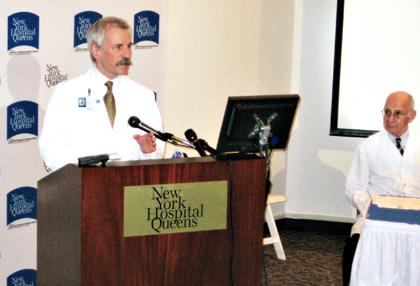By Ivan Pereira
As hospitals and schools around the borough gear up for the start of this year’s flu season, doctors and medical experts are alerting the public to make healthy lifestyle choices this winter but not overreact to swine flu concerns.
New York Hospital Queens’ administrators, along with representatives from the city and state, held a special forum at the Flushing hospital last Thursday night to prepare the public for this year’s influenza season.
After the hospital had a 305-patient spike in emergency room patients in the spring during the H1N1 outbreak, doctors said they had been working for months to not only enhance their facility to fight the virus, but also to come up with solutions for patients to sidestep getting sick.
“This is the worst-case scenario we are trying to avoid,” NYHQ’s chief medical officer, Dr. Stephen Rimar, said of the surge in patients.
Rimar said the hospital is making plans for additional flu patients and will work to keep them separated from others to prevent the virus from spreading. He also advised residents, especially seniors, pregnant women and children, to get vaccinated for all forms of the virus.
“We’re trying to get people to understand that the [regular] flu is out there, too. We could have a bad flu season,” he said.
This week the vaccine for H1N1 was shipped to health centers across Queens. In order to properly administer the vaccine through the public school system, the city Department of Health held a vaccination pilot program at six city schools, including PS 136 in St. Albans.
Health officials will study the most efficient ways to administer the vaccine and use those methods at other schools during the next couple of months.
Rimar said the best actions people can take to prevent catching the bug were common sense routines, such as washing their hands, covering their mouths when sneezing and coughing and staying home if they feel slightly ill or calling a doctor if they feel worse.
The hospital’s director of infections diseases, Dr. James Rahal, said despite the swine flu deaths reported in the city and around the country, the swine flu virus has not been a serious threat to the public. In most cases, patients have made a quick recovery and as a result have the natural antibodies to fight off a second occurrence of the disease, according to Rahal.
“If they had the H1N1 and it was confirmed, it is highly unlikely that they will get it again,” he said.
Rahal said the current strain of the swine flu lacks the biochemical makeup that would lead to other serious ailments.
“The virus does not have the component of the 1908 outbreak, which had a protein that made it easy to attack the lungs and lead to pneumonia,” he said.
In April, St. Francis Prep became the first city school to have a swine flu outbreak among its student and faculty body. In the following weeks, the city shut down several public schools after large numbers of students reported having flu-like symptoms.
Dr. Teeb Al-Samarrai, of the city Health Department, said the city will be offering the newly released H1N1 vaccine to all schoolchildren and the city will be monitoring all cases of swine flu reported by the hospitals.
City Councilman John Liu (D-Flushing) and state Assemblyman Rory Lancman (D-Fresh Meadows) said NYHQ’s forum was another essential tool in fighting swine flu because through communication people would alleviate their fears.
“The more information we can get out there on H1N1 … the better,” Lancman said.
Reach reporter Ivan Pereira by e-mail at ipereira@cnglocal.com or by phone at 718-229-0300, Ext. 146.



































